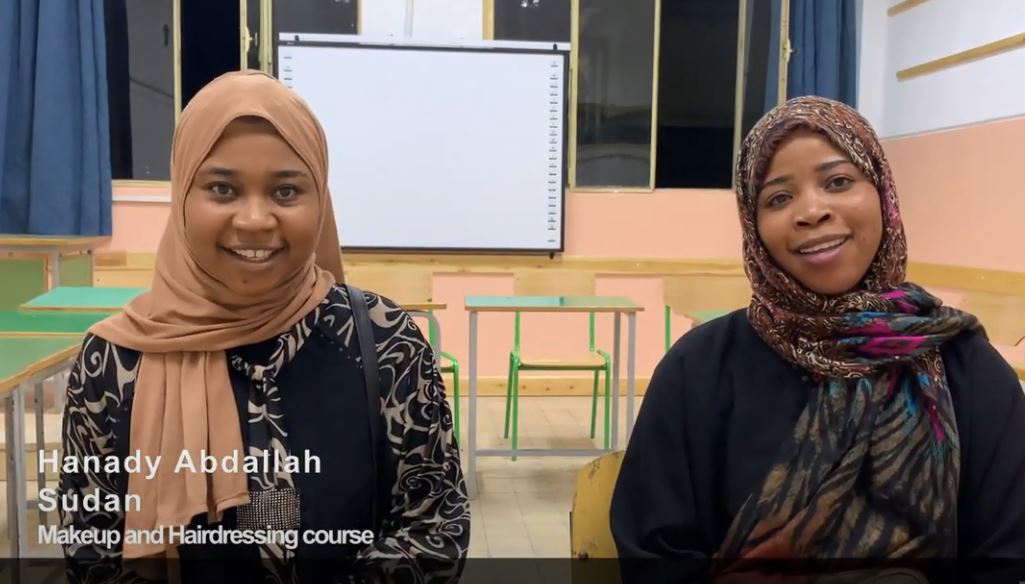
EGYPT: Refugees gain employment skills
Refugees learn skills for stable employment through a Salesian Missions project in Cairo.
NEW ROCHELLE, NY (Jan. 28, 2021) Salesian missionaries are able to offer training to assist refugees in gaining the skills needed for employment or self-employment in Egypt, thanks to funding from the U.S. Department of State’s Bureau of Population, Refugees and Migration (PRM) through a Salesian technical and vocational training center in Cairo. In 2020, 629 individuals were registered for technical and vocational courses and 60 for the micro-enterprise part of the project.
Due to the spread of the COVID-19 pandemic, Salesians had to change how they provided the training with some courses provided online, one in a small group and some courses suspended until December when they resumed once again.
This hampered some students from gaining the hands-on skills needed for their courses. It also made finding work and starting businesses difficult for the micro-enterprise participants. Salesians handled the coordination and distribution of much-needed cash assistance, as well as provided health and safety precautions for those in the program.
The project was first funded through Salesian Missions in 2014. To date, the project has improved the livelihoods and quality of life of more than 3,000 Sub-Saharan African and Syrian refugees and vulnerable Egyptians.
Rimonda Nadi, a sewing course student from Egypt, said, “After the course, I started to buy fabrics and make baby clothes. Then I started to put my products in different clothes shops for sale. This is something that brought me extreme happiness and pride because I can finally depend on myself and start to work.”
Another student, Hebba Abbas from Sudan, enrolled in the make-up and hairdressing course. She explained, “Now I am able to do full makeup for girls and brides. I have an assistant working with me too. I do the makeup and Hanady does the manicure, pedicure and different hairstyles. We are searching for more opportunities to expand our business.”
The training is also helping students connect to better jobs in the market. Khaled Raafat, an Egyptian student in the electricity course, said, “Every time I tried to apply for jobs related to electrical work, I was passed over. Since taking the course and learning life skills, I went to a job fair and had success. I’m now in a training program for a multi-national company and a senior operator in that company.”
The project also provides life skills training, health awareness, entrepreneurship literacy workshops, job panels, seed grants, and violence prevention training to help refugees build the skills needed to succeed in the workplace and adjust in their new urban environments. One of the great successes of the project is the additional social services, including transportation vouchers for travel to and from courses, fully funded for participants. Those engaged in the training are also provided vouchers to purchase groceries and other essentials from a local store. This helps to ensure that basic needs like nutrition are met.
Each participant also receives a primary care checkup and eye exam with a doctor who comes to the school. Some medicine prescriptions are included as are referrals for secondary care as needed.
Egypt serves as both a destination and a transit country for refugees and asylum seekers. More than 221,675 people of concern from over 60 countries are registered by the United Nations Refugee Agency (UNHCR)—a population increase of over 44 percent since 2016. Syrians comprise 57.8 percent of the total number of people of concern. Of the rest, 49.5 percent are from South Sudan and Sudan and 36.5 percent are from other countries in the Horn of Africa.
The vast majority have fled wars and conflict in their homelands and have come to Egypt seeking shelter and safety before moving on to their next destination. Many end up in Cairo’s slums without the means to make a living due to restrictive national labor laws for refugees and discrimination by Egyptians. Many of these refugees are women and children who have been forced into poverty with little means to provide for themselves.
###
Contact: [email protected]
